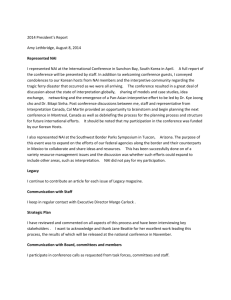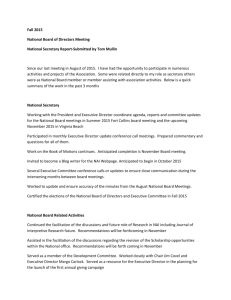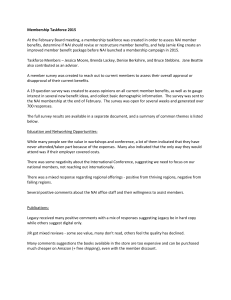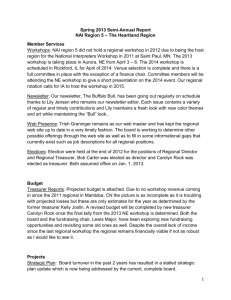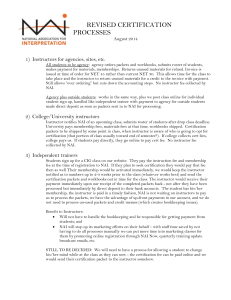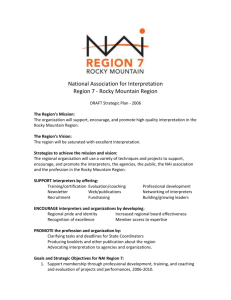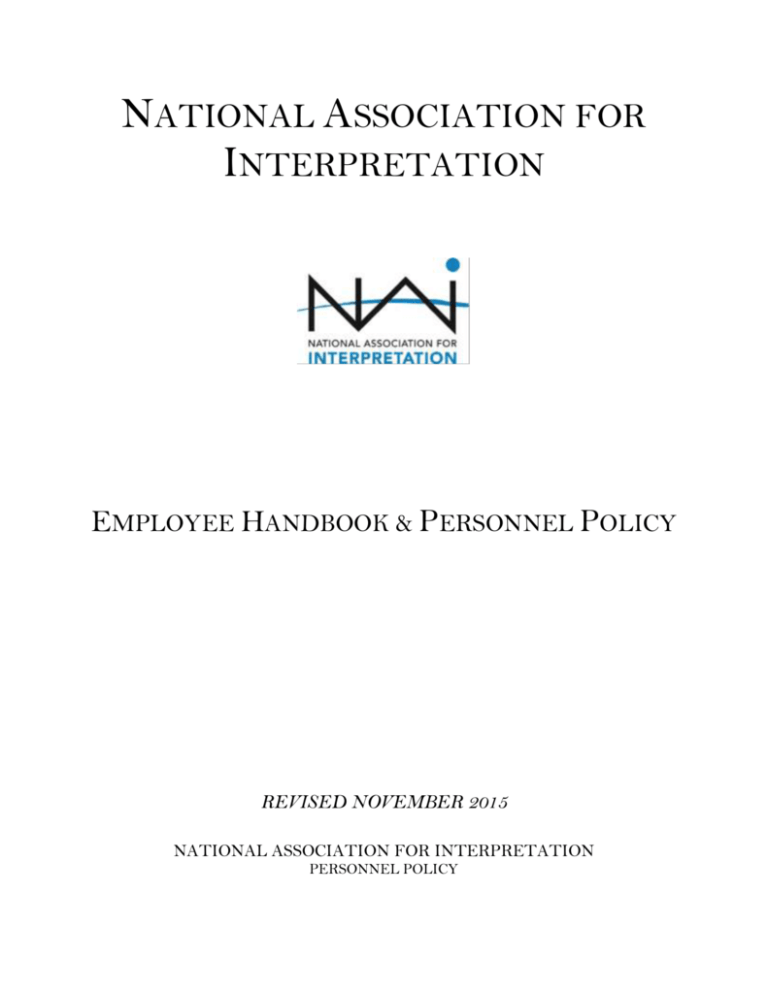
NATIONAL ASSOCIATION FOR
INTERPRETATION
EMPLOYEE HANDBOOK & PERSONNEL POLICY
REVISED NOVEMBER 2015
NATIONAL ASSOCIATION FOR INTERPRETATION
PERSONNEL POLICY
IMPORTANT – PLEASE NOTE:
These guidelines are not a contract and impose no legally enforceable
obligation on The National Association for Interpretation (NAI). Provisions of
the Employee Handbook are only guidelines that NAI may or may not follow, and
which NAI may interpret, in its sole discretion. All NAI employees are employed
at will. Employees, or NAI, may terminate the employment relationship at any
time, with or without prior notice, warning, procedure or formality, for any
reason or no reason, with NAI’s only obligation being the payment of wages
earned and benefits vested through the last day worked.
The nature, terms or conditions of NAI’s employees' employment cannot be
changed by any oral representation, custom, habit or practice, other than in
writing signed by the President of the Board of Directors or Executive Director.
In the event of conflict between this disclaimer and any other statement, oral or
written, present or future, concerning terms and conditions of employment, the
at-will relationship confirmed by this disclaimer shall control. NAI reserves the
right to change, replace, withdraw or deviate from any or all of the following
guidelines without prior notice. (Approved 11/08/05)
I - GENERAL PROCEDURES
A. EQUAL EMPLOYMENT OPPORTUNITY
The National Association for Interpretation, hereinafter NAI, does not discriminate on the basis of sex (including
pregnancy), race, color, national origin, religion, creed, age, disability, sexual orientation, or marital status.
B. OPEN DOOR POLICY
Misunderstandings or conflicts can arise in any organization. To ensure effective working relations, it is important
that such matters be resolved before serious problems develop. Most incidents will resolve themselves naturally;
however, if a situation persists that you believe it detrimental to you or to
NAI, free discussion with your supervisor or the Executive Director or the President of the Board of Directors is
encouraged.
C. WORKPLACE HARASSMENT
NAI has adopted a policy of “no-tolerance” with respect to unlawful employee harassment. In this connection, NAI
expressly prohibits any form of unlawful employee harassment based on race, color, religion, sex, national origin,
age, disability, or status in any group protected by state or local law.
Improper interference with the ability of NAI employees to perform their expected job duties is not tolerated.
VIOLATION OF THIS POLICY WILL SUBJECT AN EMPLOYEE TO DISCIPLINARY ACTION UP TO
AND INCLUDING IMMEDIATE DISCHARGE.
It is not possible to describe or define all types of harassment. However, harassment includes verbal or physical
conduct that belittles or shows hostility or aversion toward an individual because of his/her race, color, religion,
sex, national origin, age or disability, and that (i) has the purpose or effect of creating an intimidating, hostile, or
offensive working environment, (ii) has the purpose or effect of unreasonably interfering with an individual's work
performance, or (iii) otherwise adversely affects an individual's employment opportunities. Harassing conduct
includes, but it is not limited to, (i) epithets, slurs, negative stereotyping or threatening, intimidating or hostile
acts that relate to race, color, religion, sex, national origin, age or disability, (ii) written or graphic material that
belittles or shows hostility or aversion toward an individual or group because of race, color, religion, sex, national
origin, age, or disability and that is placed on walls, bulletin boards, or elsewhere on NAI premises or circulated in
the workplace and (iii) sexual advances, requests for sexual favors, unwelcome or offensive touching, and other
verbal, graphic or physical conduct of a sexual nature.
With respect to sexual harassment, NAI prohibits the following:
1. Unwelcome sexual advances; requests for sexual favors; and all other verbal or physical conduct of a
sexual or otherwise offensive nature, especially where:
Submission to such conduct is made either explicitly or implicitly a term or condition of
employment;
Submission to or rejection of such conduct is used as the basis for decisions affecting an
individual's employment; or
Such conduct has the purpose or effect of creating an intimidating, hostile, or offensive working
environment.
2. Offensive comments, jokes, innuendos, and other sexually oriented statements.
Complaint Procedure:
All employees of NAI are responsible for creating an atmosphere free of discrimination and harassment, sexual or
otherwise. Further, all employees of NAI are responsible for respecting the rights of their coworkers. If you feel
that you are being harassed in any way by another employee or by a customer, guest or vendor, it is your absolute
right and obligation to promptly make your feelings known to your supervisor. If you are not satisfied with the
way your complaint has been handled, if you do not feel comfortable discussing the matter with this individual or if
this individual is the source of the problem, you should promptly report the problem to the Executive Director or
the President of the Board of Directors. The matter will be thoroughly investigated and, where appropriate,
disciplinary action will be taken, up to and including termination. You will not be penalized in any way for
reporting such conduct concerning yourself or another person. Reprisals against any employee reporting an
allegation of harassment will not be tolerated. This policy applies to all incidents of alleged harassment, including
those which occur off-premises, or off-hours, where the alleged offender is a supervisor, coworker, or even a
nonemployee with whom the employee is involved, directly or indirectly, in a business or potential business
relationship.
Harassment complaints shall be kept confidential to the extent possible.
Should the alleged harassment occur at a time other than your normal business hours, your complaint should be
filed as early as practicable on the first business day following the alleged incident.
Please understand that NAI takes complaints of discrimination and harassment very seriously. NAI will undertake
an investigation of any complaints. If NAI determines that an employee is guilty of harassing another individual,
appropriate disciplinary action will be taken against the offending employee, up to and including termination of
employment. NAI prohibits any form of retaliation against any employee for filing a bona fide complaint under this
policy or for assisting in a complaint investigation.
DO NOT ASSUME THAT NAI IS AWARE OF YOUR PROBLEM. WE ARE NOT. IT IS
YOUR RESPONSIBILITY TO BRING INFORMATION, COMPLAINTS AND/OR CONCERNS
TO OUR ATTENTION IN ORDER THAT WE CAN TAKE ACTION TO RESOLVE THE
PROBLEM.
D. DRUG-FREE WORKPLACE
It is the policy of NAI to create a drug-free workplace in keeping with the spirit and intent of the Drug-Free
Workplace Act of 1988. The use of controlled substances is inconsistent with the behavior expected of employees,
subjects all employees and visitors to our facilities to unacceptable safety risks, and undermines NAI’s ability to
operate effectively and efficiently. In this connection, the unlawful manufacture, distribution, dispensation,
possession, sale, or use of a controlled substance in the workplace or while engaged in NAI business off NAI’s
premises is strictly prohibited.
Such conduct is also prohibited during nonworking time to the extent that in the opinion of NAI, it impairs an
employee's ability to perform on the job or threatens the reputation or integrity of NAI. Employees convicted of
controlled substance related violations in the workplace, including pleas of nolo contendere (i.e., no contest), must
inform NAI within five days of such conviction or plea. Employees who violate any aspect of this policy may be
subject to disciplinary action up to and including termination. At its discretion, NAI may require employees who
violate this policy to successfully complete a drug abuse assistance or rehabilitation program as a condition of
continued employment.
E. EMAIL AND TELEPHONE COMMUNICATIONS
All electronic and telephonic communications systems and all communications and information transmitted by,
received from, or stored in these systems are the property of NAI and as such are to be used solely for job-related
purposes. The limited use of any software and business equipment, including, but not limited to facsimiles,
computers, and copy machines for private purposes may be allowed at the discretion of the Executive Director
with reimbursement to NAI based on contractual costs.
Employees are not permitted to use a code, access a file, or retrieve any stored communication unless authorized to
do so or unless they have received prior clearance from the Executive Director or President. All pass codes are the
property of NAI. No employee may use a pass code or voice-mail access code that has not been issued to that
employee or that is unknown to NAI. Moreover, improper use of the E-mail system (e.g., spreading offensive jokes
or remarks) or the Internet will not be tolerated. Employees who violate this policy are subject to disciplinary
action, up to and including discharge.
To ensure that the use of electronic and telephonic communications systems and business equipment is consistent
with NAI legitimate business interests, the Executive Director or President of NAI may monitor the use of such
equipment from time to time. This may include listening to stored voice-mail messages, reading email or
monitoring Internet usage.
II - CATEGORIES OF EMPLOYMENT
Employee benefits are based upon an individual’s status, which, in turn, is based partially on the nature of the
individual’s tenure. All NAI employees shall fall into one of the following categories:
Regular Employees - Appointed to a position with NAI as a regular employee. Employees in this category
may be either full-time or part-time.
Consultants - Appointed, usually in an advisory capacity, on an as-needed basis.
Interns - Appointed to a position as part of a work-study or other funding program, limited to a specific
period of time, with either a single duty or a variety of assignments.
Temporary - Appointed to a specific work program under contract with NAI for a limited duration of
time. Seasonal employees would be included in this category.
Exempt/Non-Exempt - All employees will be designated either exempt or non-exempt at the time of
their hire or promotion, in accordance with the Federal Fair Labor Standards Act (FLSA). The FLSA,
administered by the US Department of Labor, specifies wage and overtime requirements for employees
subject to its provisions. Determination of exemptions is made based on a series of tests outlined in the
law and is, in all cases, subject to legal interpretation and review. ALL overtime must be authorized by
the Executive Director prior to it taking place.
Employment At Will - Unless an employee has an executed written contract with NAI, employment with
the Association is terminable at will of the employee or NAI, at any time, without notice, cause or any
specific disciplinary procedures.
III - HOURS OF WORK AND OVERTIME
Eight hours shall constitute a day’s work. The standard workweek shall consist of forty hours. In accordance with
the federal Fair Labor Standards Act, time worked beyond 40 hours in one week or 12 hours in a day by nonexempt employees shall be paid at one and one-half times the employee’s regular rate of pay. The Executive
Director must approve overtime in advance.
IV - BENEFITS
A regular, full-time employee is one who works a 40-hour week. A part-time employee is any employee who works
fewer than 40 hours per week as a routine. All regular, full-time and regular, part-time employees working an
average of 32 hours per week or more are eligible for all NAI benefits as identified below at the time of vestment.
This vestment policy identifies who will be eligible for vacation, holiday and sick leave benefits and the timing at
which it begins. Vestment shall occur on the first day of the first full month of employment for regular, full-time
employees, and for regular, part-time employees, working more than an average of 32 hours per week.
Regular, part-time employees, working fewer than an average of 32 hours per week, do not receive benefits.
The following is a list of benefits offered by NAI and details related to them:
A. NAI Membership
B. Paid Vacation Leave
C. Paid Sick Leave
D. Paid Holiday Leave
E. Health Insurance
F. Retirement
G. Long Term Disability Insurance
H. Maternity/Paternity Benefit
NOTE: All benefits described herein may be modified, suspended or terminated at the sole and absolute discretion
of NAI, without formal notice.
A. NAI MEMBERSHIP
Each employee will be carried on the rolls as a Professional Member of NAI for as long as he or she is employed
and shall receive products and services related to that membership category at no charge. Employees who have life
membership at the time of hiring will continue to receive services normally as a member of that category.
Employees will not have voting privileges or serve in volunteer roles while working for the Association.
B. VACATION LEAVE
1. Approval for vacation time will be made by the Executive Director; and extended leave of absence (over one
week) for the Executive Director will be made by the Vice President for Administration. Approval of time for
other regular staff will be made by the employee’s supervisor. Leave without pay (LWOP) may be granted by the
Executive Committee for special situations such as parent/family, educational, etc.
2. All regular full-time and part-time employees shall earn vacation days with pay in accordance with the following
schedule. Employees may receive credit for previous related work experience that applies to the vacation rate
schedule with approval of the Executive Director or Executive Committee at the time of hiring.
Vacation Accrual Schedule Per Year *:
Date of hire -> 3 years
3 years -> 5 years
5 years -> 10 years
over 10 years
=
=
=
=
10 days (80 hours)
15 days (120 hours)
20 days (160 hours)
25 days (200 hours)
[* Work year for vacation purposes is a 12-month period following the date of hire.]
3. It is the policy of NAI to encourage employees to take the vacation leave they have earned. However, vacation
leave may be carried over from year to year up to 160 hours (4 weeks). Vacation time is automatically paid at the
existing salary rate up to 80 hours when the employee resigns or is terminated after his/her hiring anniversary
date and before he/she has taken his/her vacation.
In an effort to accommodate the desires of our employees who would like to take their vacations early in the year,
employees will be permitted to “borrow” against the vacation they expect to accrue over the course of a vacation
year. It is understood, however, that if employment with NAI is terminated for any reason prior to the time that
you have accumulated the number of vacation days taken during the vacation year, you will be responsible for
reimbursing NAI for the amount of used but un-accrued vacation. At the time you “borrow” against the unaccrued vacation, you will be expected to execute a written authorization that would allow NAI to deduct the
amount of used but un-accrued vacation from your final paycheck, should that be necessary.
4. During a period of illness of an employee and after accumulated sick leave has been exhausted, vacation time
may be used, if there is vacation time remaining.
5. Leaves of absence without pay will not be used to accrue vacation or sick leave time.
6. Vacation pay accrues for full-time employees at hiring, and for regular, part-time employees working an average
of 32 hours per week or more at vestment.
C. SICK LEAVE
1. Sick leave is to be used for illness and lengthy medical appointments. Sick leave can also be used for caring for
immediate family or spouse. For the Executive Director, notification is made to the Vice President of
Administration; office staff gives notification to the appropriate supervisor for sick leave. Extended sick leave may
require doctor’s certification at request of the Executive Director or Vice-President for
Administration. Employees should obtain Executive Director’s approval for scheduled sick leave in advance. For
unscheduled absences, employees should notify their supervisor as soon as possible.
2. All staff accrues four hours of sick leave for every eighty hours worked. Sick leave can be accrued and carried
over year to year up to 480 hours (8 weeks). Unused sick leave days are NOT paid for upon termination of
employment (voluntary or involuntary).
3. Authorized sick leave will be granted for:
a) Personal illness or physical incapacity for which compensation under the terms of the Worker’s
Compensation Act does not apply.
b) Illness or physical incapacity of employee’s immediate family requiring his/her personal attention up to a
maximum of three days per each incident.
4. All on-the-job related injuries and illnesses must be reported immediately to the supervisor, and will be subject
to Worker’s Compensation Act rules and regulations.
D. HOLIDAY LEAVE
1. All regular, full-time employees and regular, part-time employees who work more than an average of 32 hours
per week shall be paid for the following holidays: New Year’s Day, Martin Luther King Day, Memorial Day,
Independence Day, Labor Day, Thanksgiving Day and Christmas Day. In addition, four additional personal
holidays will be provided to regular, full-time employees. Employees may use these days with prior approval of
their supervisor. Such personal holidays will not carry over from year to year and will not be paid at end of year or
at end of employment.
2. Employees may be asked to work holidays and may take another paid day off in its place and will be reimbursed
straight time (not overtime). The NAI National Office will be closed New Year’s Day, Memorial Day,
Independence Day, Labor Day, Thanksgiving Day, and Christmas Day.
E. HEALTH INSURANCE
All regular, full-time employees when hired and regular, part-time employees working more than
an average of 32 hours per week when vested will receive health benefits through the managed care program
selected by the Executive Director. If the employee elects personal coverage only with no spouse or dependent
coverage, NAI will pay 100% of the coverage. If family coverage is chosen, the Association will pay up to 80% of
the health care program costs dependent on budget availability and at least 20% will be paid by the employee as a
pre-tax payroll deduction.
F. RETIREMENT
All regular, full-time employees who are vested will receive an employer retirement plan contribution according to
the approved percentage in the annual budget in the form of a Salary Reduction Simplified Employee Pension Plan
(SARSEP). A pre-tax 403 (b) Non-ERISA plan will also be offered to employees as a payroll deduction in an
amount they designate up to the IRS limits. There is no vesting schedule since the plan is for employee-only
contributions.
G. LONG TERM DISABILITY
All regular, full-time employees and regular, part-time employees working more than an average of 32 hours per
week who are vested will receive long term disability insurance coverage within limits set by the annual budget.
H. MATERNITY/PATERNITY/ADOPTION BENEFITS
1. Maternity/paternity/adoption leave under this policy is a paid leave associated with the birth of a regular, fulltime employee’s own child or the placement of a child with the employee in connection with adoption or foster
care. Maternity/paternity/adoption leave is not charged against the employee’s other paid leave credits, and the
amount of paid days received is two weeks. The paid leave is compensated at the following levels:
• Less than one full year of service—40 percent of salary.
• After one full year of service—60 percent of salary
• After five full years of service—100 percent of salary.
If both parents are employees, only one may access the paid benefits of this policy. Both, however, continue to be
entitled to family and medical leave if eligible. Temporary and part time employees are not eligible for paid
maternity/paternity/adoption leave under this policy.
2. Health insurance benefits will continue to be provided during the paid maternity/paternity/adoption leave
under this policy at the same rate as in effect before the leave was taken regardless of length of service, provided
the employee has at least one full year of service. Paid leave benefits will continue to accrue.
3. The employee must provide to the department head 30 days’ notice of the requested leave (or as much notice as
practicable if the leave is not foreseeable. After the two weeks of maternity/paternity/adoption leave have been
exhausted, subsequent leave will be covered under appropriate policies. The Family and Medical Leave Act
(FMLA) allows employees up to 12 workweeks of unpaid leave annually. Paid leave under this policy will run
concurrently with FMLA leave. After paid maternity/paternity leave is exhausted, the employee is required to
apply any other available paid leave, which will also run concurrently with FMLA leave.
4. New parents—both mothers and fathers—can take FMLA leave any time in the first 12 months after a child’s
arrival. But employees must conclude their leave before the 12-month period ends.
5. Following any paid/unpaid leave taken, the employee may request a flexible work schedule (to last no longer
than 9 months) subject to approval by employee’s supervisor that may include, but not be limited to:
a) Telecommuting
b) Compressed workweeks (working 10 hour days rather than 8, leaving a 3 day weekend or similar)
c) Bringing the infant to work, provided this is not disruptive to other staff
d) Other alternatives, as presented, to help parents create a strong work/life balance.
V – OTHER TYPES OF LEAVE
A. JURY AND WITNESS DUTY LEAVE
If you are a regular employee who is summoned to jury duty, NAI continues your regular wage, up to $50.00 per
day, during your active period of jury duty for up to a maximum of three working days per calendar year. You are
also permitted to retain the allowance you receive from the court for such service.
All employees are allowed unpaid time off if summoned to appear in court as a witness. To qualify for jury or
witness duty leave, you must submit to your supervisor a copy of the summons to serve as soon as it is received. In
addition, certificate of service must be submitted to your supervisor when your period of jury or witness duty is
completed.
B. MILITARY LEAVES OF ABSENCE
Leaves of absence without pay for military or Reserve duty are granted to full-time regular and part-time regular
employees. If you are called to active military duty or to Reserve or National Guard training, or if you volunteer
for the same, you should submit copies of your military orders to your supervisor as soon as is practicable. You
will be granted a military leave of absence without pay for the period of military service, in accordance with
applicable federal and state laws. If you are a reservist or a member of the National Guard, you are granted time
off without pay for required military training. Your eligibility for reinstatement after your military duty or
training is completed is determined in accordance with applicable federal and state laws.
D. BEREAVEMENT LEAVE
Bereavement pay of no more than three (3) days may be granted to Regular Full Time Employees at the discretion
of NAI when the death of an immediate family member necessitates absence from work. Immediate family is
defined as: spouse, child, parent, brother, sister, grandchild, grandparent and in-laws defined as brother, sister,
parent or grandparent.
E. COLORADO DOMESTIC VIOLENCE LEAVE
A Colorado employee who is a victim of domestic violence will be granted up to 3 working days of leave in any
twelve-month period to: (1) seek a temporary restraining order; (2) obtain medical care for himself or his children;
(3) make his home secure; or (4) seek legal assistance or attend a court proceeding to address issues arising from
the need for this leave. In accordance with state law, the employee must have been employed for one year to be
eligible for domestic violence leave.
Leave will be granted provided the employee gives NAI reasonable advance notice (3 days or more) of the
employee's intention to take time off and provides appropriate documentation, which could include documentation
from the court or the prosecuting attorney that the employee appeared in court. In cases of imminent danger to
the health and safety of the employee, reasonable advance notice is not required.
An employee must use any accrued unused vacation or paid time off before continuing leave on an unpaid basis.
To the extent allowed by law, NAI shall maintain the confidentiality of any employee requesting domestic violence
leave.
F. VOLUNTEER LEAVE
At the discretion of the Executive Director, a regular, full-time employee may be granted administrative leave for
the purpose of volunteer work not to exceed 8 hours per month.
VI - PERFORMANCE AND CONDUCT
A. PERFORMANCE EVALUATION
The purpose of periodic Personnel Assessment (PA) is to help NAI employees grow personally and professionally,
and to define personal and job-related objectives. It also provides a means to ensure that the responsibilities and
expectations of employees and NAI are clearly defined and agreed upon. The evaluation procedure should also
allow opportunity for employees to evaluate and discuss the organization and its strengths and weaknesses in a
meaningful way. The nature of the evaluation should be supportive but also honest and straightforward. The
written evaluation shall consist of a performance self-review based upon the employee’s job description and
objectives, followed by the supervisor’s comments and review of performance. This should also be the time to
discuss how well the current job description meets the needs of the Association. The written evaluation shall be
discussed and signed by the supervisor and staff member. The evaluation of staff is intended to be part of a process
requiring a regular and ongoing dialogue between each staff member and his/her supervisor. The evaluation will
become an integral part of each employee’s personnel history with NAI.
Written employee evaluations will be done annually, and verbal evaluations will be done mid-year. The Executive
Director shall review and approve all staff personnel assessments. The Vice-President of Administration shall
coordinate the personnel assessment of the Executive Director by the Board of Directors.
B. GUIDELINES FOR APPROPRIATE CONDUCT
As an integral member of NAI’s team, employees are expected to accept certain responsibilities, adhere to
acceptable business principles in matters of personal conduct, and exhibit a high degree of personal integrity at all
times. This involves respect for the rights and feelings of others refraining from any behavior that might be
harmful to any employee, coworkers, and/or NAI, or that might be viewed unfavorably by current or potential
clients or by the public at large.
NAI expects all employees to perform their jobs to the highest professional and business standards at all times and
will not tolerate inappropriate or insubordinate conduct. NAI therefore reserves the right, in all instances, to
impose discipline, up to and including discharge, with or without prior warning, procedure, or formality for
inappropriate or insubordinate conduct. While common sense is the best guide for determining whether conduct is
appropriate, if you have any questions concerning the permissibility of any action, you are responsible for
contacting your supervisor, in advance, for clarification. Whether an employee's performance, conduct or behavior
warrants disciplinary action is within the judgment and discretion of NAI, as is the appropriate type of discipline
in a particular instance. NAI does not intend by these guidelines to create any expectation that any employees will
be assured of any particular form of disciplinary action, such as warnings or notice, or progressive discipline, prior
to discharge. Rather, discipline shall in all cases be imposed at NAI’s discretion, in consideration of factors NAI
deems appropriate.
C. WORKPLACE VIOLENCE
NAI is concerned about the increased violence in society, which has also filtered into many workplaces throughout
the United States, and has taken steps to help prevent incidents of violence from occurring at NAI. In this
connection, it is the policy of NAI to expressly prohibit any acts or threats of violence by any Company employee
or former employee against any other employee in or about NAI facilities or elsewhere at any time. NAI also will
not condone any acts or threats of violence against NAI employees, clients, or visitors on NAI premises at any
time or while they are engaged in business with or on behalf of NAI, on or off NAI premises.
In keeping with the spirit and intent of this policy, and to ensure NAI’s objectives in this regard are attained, NAI
is committed to the following:
1. To provide a safe and healthful work environment, in accordance with NAI’s safety and health policy.
2. To take prompt remedial action up to and including immediate termination, against any employee who
engages in any threatening behavior or acts of violence or who uses any obscene, abusive, or threatening
language or gestures.
3. To take appropriate action when dealing with clients, former employees, or visitors to NAI’s facilities
who engage in such behavior. Such action may include notifying the police or other law enforcement
personnel and prosecuting violators of this policy to the maximum extent of the law.
4. To prohibit employees, former employees, clients, and visitors from bringing unauthorized firearms or
other weapons onto NAI’s premises.
5. To establish viable security measures to ensure that NAI’s facilities are safe and secure to the maximum
extent possible and to properly handle access to company facilities by the public, off-duty employees, and
former employees.
In furtherance of this policy, employees have a "duty to warn" their supervisors, of any suspicious workplace
activity or situations or incidents that they observe or that they are aware of and involve other employees, former
employees, clients, or visitors that appear problematic. This includes, for example, threats or acts of violence,
aggressive behavior, offensive acts, threatening or offensive comments or remarks, and the like. Employee reports
made pursuant to this policy will be held in confidence to the maximum possible extent. NAI will not condone any
form of retaliation against any employee for making a report under this policy.
VII – SEPARATION
A. VOLUNTARY
Employees planning to resign their employment are requested to give notice as follows:
1. Full-time employees: shall give notice at least 14 calendar days prior to the effective date.
2. Part-time and temporary employees: shall give at least five working days notice.
Resignation without such prior notice shall be designated as ‘unsatisfactory service’ separations, if in the opinion of
the Executive Director such resignation impairs the effectiveness of NAI. Employees who resign shall be eligible
for future employment with NAI and are subject to the same requirements that apply to new applicants.
B. INVOLUNTARY
Employment with NAI is at the will and either the employee or NAI may terminate the employment relationship
at any time and for any reason not prohibited by law, and this section on involuntary dismissal should not be read
in any way to change or limit the at will nature of employment with NAI.
C. EXECUTIVE DIRECTOR
The Executive Director of NAI serves at the will of the Board of Directors and is subject to the regulations and
conditions listed in this section, and the Executive Director’s job description and conditions of employment
documents.
VIII - OUTSIDE EMPLOYMENT
NAI expects that full-time employees will do their utmost to perform in the best interests of NAI.
In keeping with this philosophy, employees may seek second jobs with another employer provided that the
Executive Director and/or Executive Committee is notified, and that:
1. The performance of such secondary work does not simultaneously benefit both NAI and the second
employer, and
2. The second job does not create a conflict of interest between the employee and NAI or its members, and
3. Such secondary employment does not jeopardize the work of NAI, its goals, its mission, or its tax-exempt
status.
An employee may not work for a secondary employer, or on behalf of his/her self-employment, on NAI time or
using NAI equipment, supplies or resources. Doing so may be cause for dismissal.
IX - CONFLICT OF INTEREST
All NAI employees are expected to act at all times in NAI’s best interests and to exercise sound judgment
unclouded by personal interests or divided loyalties. In performing duties both at NAI and in outside activities,
employees should avoid conflicts of interest as well as the appearance of conflicts of interest. Employees should
report a potential conflict of interest to the Executive Director for a ruling of appropriateness.
NAI’s business decisions will be made without bias or favoritism on the part of any of its employees. Each
employee must comply with the policies and procedures of NAI, maintain the confidentiality of information
required in the performance of his or her duties and not use his or her position or knowledge acquired in carrying
out job responsibilities and duties for personal gain or as a representative of other interests, public or private.
As a general rule, employees may not receive or offer any gift or anything else of significant value for the purpose
of influencing the action of NAI or of the recipient. Value amounts should not exceed $100 per incident or $200
accumulated annually with any vendor, supplier, consultant or grantee.
X - TRAVEL AND OTHER EXPENSE REIMBURSEMENT
Employees who are required to travel in connection with their duties or, who incur other authorized expenses on
behalf of NAI, will be reimbursed for those expenses according to the guidelines in the NAI Travel Policy and
upon submitting an expense reimbursement form. Receipts are required for reimbursement of all meals, lodging,
transportation and other expenses with the exception of out of pocket expenses (such as tips, tolls, metro fees, etc.),
which are not to exceed $25 per day. It is expected that out of pocket expenses will be actual amounts expended
and will not be considered a per diem compensation. The Executive Director must approve all expense
reimbursements.
Key aspects of the NAI Travel Policy (consult full policy for detail)
• Mileage reimbursement will be at the federal rate for travel reimbursement.
• Reimbursement for meals will be actual amount not to exceed $65/day or federal per diem rate, whichever is less.
• Reimbursement requests must be made within the fiscal year in which the travel occurred or sixty days following
the travel at the year’s end or they will not be paid.
• Receipts are required for all expenses except minor out-of-pocket expenses such as tips, tolls, metro fees, etc., not
to exceed $25 per day.
• The E.D. and staff travel expenses will be covered in full for all NAI events, workshops and meetings at which
their attendance is required.
• Regional, sectional or chapter fees will be waived for the E.D. and staff when in attendance at their workshops or
events.
XI - PERSONNEL FILES
“Personnel File” means any and all personnel records created and maintained by an employer and pertaining to an
employee including, but not limited to, employment applications, internal evaluations, disciplinary documentation,
payroll records, vacation and sick leave records, injury reports, and performance assessments, whether maintained
in one or more locations. Personnel files for each employee will be maintained in the Administrative Offices. The
files are confidential. Any individual requesting access to a personnel file other than their own may do so only on a
demonstrated need-to know basis and must request that access through the Vice President for Administration or
President. A signature sheet for individuals other than the supervisor and Administrative Officers (Administrative
Officers means the President, Vice President for Administration, Executive Director) will be placed in the
personnel folder that was accessed and signed by the individual who requested such access.
XII – RAISES AND BONUSES
An employee may receive an increase in salary based on cost of living adjustments, meritorious service or
acceptance of additional job responsibilities as recommended by the Executive Director in accordance with the
approved salary schedule. Salary increases shall be considered only if the employee has satisfactorily carried out
the responsibilities of his/her position and NAI has the financial capacity to cover salary increases. Staff may
receive annual bonuses as approved by the Executive Director. All changes to salary and benefits must be
approved by the Executive Director within the limits of the approved annual budget. Raises and bonuses for the
Executive Director are approved by the Board of Directors.
XIII HEALTH & SAFETY
A. NAI HEALTH AND SAFETY POLICY AND PROCEDURES
• It is the intention of the Board of Directors that all NAI employees shall work in a healthy, safe work
environment and be encouraged to participate in and promote safe practices at work and while traveling for the
organization.
• All NAI employees are clerical or administrative workers by job description and should refrain from activities
that are unrelated to those roles while at work.
• It is the policy of the Board of Directors that the Executive Director administer all health and safety policies and
procedures.
• All necessary precautions should be taken when undertaking any duties with potential for injury of employees.
• In the event that an employee is asked to perform any task requiring specialized training, that training will be
provided at the expense of the employer in advance of performance of the duties.
Procedures:
• If an accident occurs, it should be reported immediately to the Vice President of Administration or
Executive Director. If there is any danger to the employee, she or he should be taken immediately to the
Preferred Provider at Poudre Valley Hospital Emergency Room for care and then notify the VP or ED.
• If an emergency occurs outside of Fort Collins, the injured employee must be taken immediately to the closest
full service medical center or hospital and then report the event to the VP or ED.
• An accident report must be filled out immediately when any accident occurs at work or during work hours at an
event and turned in to the Executive Director within 24 hours.
• In the event of an accident that prevents handling of normal duties, the employee will be asked to return to work
for light duties as soon as released to do so by the attending physician.
• If the attending physician prescribes rehabilitative care or special therapy programs, they must be arranged with
our Preferred Provider or a licensed health care professional recommended by the PP in writing.
• Employees who seek medical or other kinds of treatments or therapy, not prescribed by the Preferred Provider,
will be liable for costs incurred.
B. EMPLOYEE USE OF VEHICLES
From time to time you may be required to use your vehicle or a NAI vehicle for NAI related matters. If you are
requested to use a vehicle for a NAI-related matter, you must have a valid driver’s license and, if you are using
your personal vehicle, your personal vehicle insurance which covers you while operating personal vehicles on NAI
business. You may be required to periodically have the status of your driver’s license checked by NAI.
If you use a vehicle for a NAI-related matter, you are prohibited from using a cellular telephone in the vehicle
unless:
Your cellular telephone is equipped with a hands-free or voice-activated device and your assessment of
the circumstances indicates that your operation of the cellular telephone will not compromise your
driving ability; or
You are making or taking a call from a vehicle that is completely stopped and parked in a safe location
(not a red light or the like).
Similarly, you are not to eat while driving or to engage in any other activity that may distract you from your
driving. You are also required to always wear a seatbelt and not allow riders in your car while on NAI business,
unless you are authorized to do so by NAI. Violations of this policy will result in disciplinary action, up to and
including discharge.
EMPLOYEE ACKNOWLEDGMENT FORM
I acknowledge that I have received a copy of NAI’s employment guidelines. I
understand that NAI’s guidelines are not a contract and impose no legal obligation of any kind
on NAI. I understand my employment with NAI is “ at will”, and may be terminated by me or
by NAI at any time, without prior notice, at any time, without any procedure or formality, for
any reason or no reason, NAI’s sole obligation being payment of wages earned and benefits
vested, if any, as of the date and hour of termination.
No representative of NAI, other than its Executive Director or President, has the
authority to enter into a contract with any employee concerning any term or condition of
employment and that authority can be exercised only in writing signed by the employee and by
the Executive Director or President. In the event of any contrary statement, oral or written,
now or in the future, the at-will relationship established by this paragraph shall occur.
Provisions in the Employee Handbook are only guidelines that NAI may or may not follow,
and which NAI may interpret, in its sole discretion. No Employee Handbook provision or
collection of provisions creates an express or implied contract or other legal rights as to
duration or any other condition of employment. NAI reserves the right to change Employee
Handbook provisions at any time without prior notice.
EMPLOYEE'S NAME (printed): __________________________________________________
EMPLOYEE'S SIGNATURE: ____________________________________________________
SOCIAL SECURITY NUMBER: _________________________________________________
DATE: ____________________
[Leave in Manual for Employee]
EMPLOYEE ACKNOWLEDGMENT FORM
I acknowledge that I have received a copy of NAI’s employment guidelines. I
understand that NAI’s guidelines are not a contract and impose no legal obligation of any kind
on NAI. I understand my employment with NAI is “ at will”, and may be terminated by me or
by NAI at any time, without prior notice, at any time, without any procedure or formality, for
any reason or no reason, NAI’s sole obligation being payment of wages earned and benefits
vested, if any, as of the date and hour of termination.
No representative of NAI, other than its Executive Director or President, has the
authority to enter into a contract with any employee concerning any term or condition of
employment and that authority can be exercised only in writing signed by the employee and by
the Executive Director or President. In the event of any contrary statement, oral or written,
now or in the future, the at-will relationship established by this paragraph shall occur.
Provisions in the Employee Handbook are only guidelines that NAI may or may not follow,
and which NAI may interpret, in its sole discretion. No Employee Handbook provision or
collection of provisions creates an express or implied contract or other legal rights as to
duration or any other condition of employment. NAI reserves the right to change Employee
Handbook provisions at any time without prior notice.
EMPLOYEE'S NAME (printed): _________________________________________________
EMPLOYEE'S SIGNATURE: ___________________________________________________
SOCIAL SECURITY NUMBER: _________________________________________________
DATE: ____________________
[Employee Personnel File Copy]

